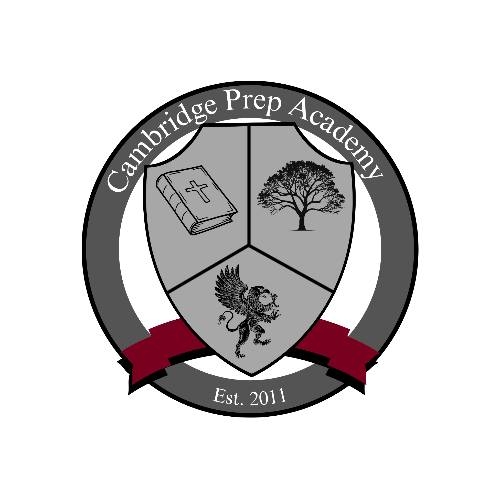
Who We Are
 Cambridge Prep Academy is a fully accredited private school with grades Pre-K (3-4) through Twelfth. Our school is Montessori Based, innovative, and utilizes technology as a tool for enhanced learning. We expose our students to Higher Education through Dual Enrollment. Our program liberates students from classes that are too large, move too fast or too slow, bullying, and other factors that stand in the way of success.
Cambridge Prep Academy is a fully accredited private school with grades Pre-K (3-4) through Twelfth. Our school is Montessori Based, innovative, and utilizes technology as a tool for enhanced learning. We expose our students to Higher Education through Dual Enrollment. Our program liberates students from classes that are too large, move too fast or too slow, bullying, and other factors that stand in the way of success.
We believe in our motto.... From small acorns grow mighty oaks - planting the seeds for tomorrow's leaders!
Combining award-winning Christian based curriculum with our exceptional teachers, an amazing support team, and an individualized learning approach for every student, Cambridge Prep Academy puts in motion a complete program tailored to helping your child learn and excel.
Our Roots

By offering small class sizes and focusing on individual strengths, we can individualize your child's education and greatly increase their learning - both now and in the future. We believe we can strengthen the roots of education by teaching the fundamentals of the core subjects, developing effective study skills, instilling personal confidence, and holding students accountable. Cambridge Prep Academy offers the support and nourishment that your child needs to flourish in their education for future growth.
Core Values

To instill a sense of autonomy, capability and positive self-image in each child.
To create an environment rich in opportunities for each child to learn from exploration, creativity, discovery and challenges.
To create “mini” classroom communities within the school community, a family which includes our children, their families, our staff and their families.
To provide our children with educators who delight in developing one on one relationships with each student; who excel in teaching strategies and techniques, who deliver constant quality of care and who, themselves are the ultimate role models for behavior and interactions.
To provide curriculum for the academic, social, emotional and physical development of each child.
To ensure that each situation or environment presented, is age and developmentally appropriate for our students.
To constantly grow and learn as a school and a staff, so that we may always provide the best in care, education and employment for those in our family.
Mission

At Cambridge Prep Academy, our mission is to provide individualized assessments and pathways for each student's progress. We are committed to offering an exceptional education by enriching lessons through engaging activities like hands-on experiments, group projects, research, and collaborative learning. Through carefully planned field trips that align with our unit studies, we create a dynamic and supportive environment.
In addition to core classes, our well-balanced schedule allows students in grades 6-12 to explore a variety of additional courses, including Dual Enrollment, Journalism, Robotics, Theater, Bible, Student Council, Spanish Club, 4-H, and Travel Club. These programs further contribute to their educational development.
Moreover, we strive to instill values and standards aligned with Christian beliefs, helping students recognize how these principles can positively impact their success. Our motto, "From Small Acorns Grow Mighty Oaks, Preparing Today For Tomorrow's Leaders," embodies our belief in nurturing each student's potential.
Inspired by Joshua 3:5, where Joshua instructed the people to consecrate themselves as amazing things awaited them, we encourage our students to prepare themselves for the remarkable opportunities that lie ahead.
Based on the mission statement provided, the following clearly defined goals for student learning can be inferred:
Individualized assessment: The goal is to assess each student individually to understand their strengths, weaknesses, and learning needs.
Progress opportunities: The aim is to provide students with opportunities for progress whenever possible, ensuring that they can continuously grow and improve.
Hands-on experiments and projects: The goal is to enhance lessons through hands-on experiments, group projects, and research, promoting active learning and critical thinking skills.
Collaboration and teamwork: The objective is to encourage students to collaborate with their peers, fostering social skills, communication, and teamwork abilities.
Field trips and unit studies: The aim is to support the implementation of unit studies by integrating field trips, which can provide real-world context and experiential learning opportunities.
Safe and nurturing environment: The goal is to provide a safe and nurturing environment that enables students to learn and thrive.
Well-balanced schedule: The objective is to offer a well-balanced schedule that allows students to explore additional classes beyond core subjects, providing them with a diverse range of educational experiences.
Values and Christian beliefs: The aim is to instill values and standards aligned with Christian beliefs, helping students understand how these principles contribute to their success.
These goals highlight a focus on individualized assessment, progress, hands-on learning, collaboration, real-world context, safety, a well-rounded education, and character development. However, it is important to note that the stated mission statement does not provide direct, explicit learning outcomes or performance standards.
Vision and Philosophy
.jpg/459595575_1057163329742208_1998808687994148441_n(1)__480x270.jpg)
Cambridge Prep Academy is a standard-based Elementary/Middle/High School. It is our belief that collaborative curriculum, small class sizes, and dedicated staff members lead to a strong educational foundation for students attending our school. Every effort will be made to assure that all students in our school are at or above grade level.
Statement of Faith
 The Statement of Faith is the foundation on which Cambridge is based. It reflects the key elements of Christianity which is central to the core values of the school. The substance of these statements is considered primary basis of which Cambridge Prep Academy is built upon.
The Statement of Faith is the foundation on which Cambridge is based. It reflects the key elements of Christianity which is central to the core values of the school. The substance of these statements is considered primary basis of which Cambridge Prep Academy is built upon.
1. We believe that men divinely inspired by God, wrote the Holy Bible.
2. We believe in only one true, living God. He is the Creator, Redeemer, Sustainer, and Ruler of the Universe.
3. We believe that man was created directly in God’s own image, after His own likeness and created without sin. However, by his free choice, he sinned against God and came under condemnation.
4. We believe in Christ’s atonement as the voluntary substitution of Himself in the sinner’s place. He was crucified, buried and resurrected from the dead with a glorified body, on the third day.
5. We believe that the family is ordained of God and that marriage is between a man and a woman.
6. We believe in pro-life and that abortion is taking a life.
7. We believe in the spiritual unity of all believers in the Lord Jesus Christ.
Historical Perspective

Cambridge Prep Academy officially opened in January of 2012. Our core values and standards set us apart from mainstream education. Our experience and dedication make it possible for us to utilize a wide variety of tools, enhancing the learning of our students. From experiments in class, group projects, peer on peer learning and field trips to help implement unit studies, our school looks to reach every style of learning. All of this while in a safe and nurturing environment.
Code of Ethics

The professional educator strives to create a learning environment that nurtures to fulfillment the potential of all students. The professional educator acts with conscientious effort to exemplify the highest ethical standards.
The professional educator responsibly accepts that every child has a right to an uninterrupted education free from strikes or any other work stoppage tactics.
PRINCIPLE I: Ethical Conduct toward Students
The professional educator accepts personal responsibility for teaching students character qualities that will help them evaluate the consequences of and accept the responsibility for their actions and choices. We strongly affirm parents as the primary moral educators of their children. Nevertheless, we believe all educators are obligated to help foster civic virtues such as integrity, diligence, responsibility, cooperation, loyalty, fidelity, and respect-for the law, for human life, for others, and for self.
The professional educator, in accepting his or her position of public trust, measures success not only by the progress of each student toward realization of his or her personal potential, but also as a citizen of the greater community of the republic.
1. The professional educator deals considerately and justly with each student, and seeks to resolve problems, including discipline, according to law and school policy.
2. The professional educator does not intentionally expose the student to disparagement.
3. The professional educator does not reveal confidential information concerning students, unless required by law.
4. The professional educator makes a constructive effort to protect the student from conditions detrimental to learning, health, or safety.
5. The professional educator endeavors to present facts without distortion, bias, or personal prejudice.
PRINCIPLE II: Ethical Conduct toward Practices and Performance
The professional educator assumes responsibility and accountability for his or her performance and continually strives to demonstrate competence.
The professional educator endeavors to maintain the dignity of the profession by respecting and obeying the law, and by demonstrating personal integrity.
1. The professional educator applies for, accepts, or assigns a position or a responsibility on the basis of professional qualifications, and adheres to the terms of a contract or appointment.
2. The professional educator maintains sound mental health, physical stamina, and social prudence necessary to perform the duties of any professional assignment.
3. The professional educator continues professional growth.
4. The professional educator complies with written local school policies and applicable laws and regulations that are not in conflict with this code of ethics.
5. The professional educator does not intentionally misrepresent official policies of the school or educational organizations, and clearly distinguishes those views from his or her own personal opinions.
6. The professional educator honestly accounts for all funds committed to his or her charge.
7. The professional educator does not use institutional or professional privileges for personal or partisan advantage.
PRINCIPLE III: Ethical Conduct toward Professional Colleagues
The professional educator, in exemplifying ethical relations with colleagues, accords just and equitable treatment to all members of the profession.
1. The professional educator does not reveal confidential information concerning colleagues unless required by law.
2. The professional educator does not willfully make false statements about a colleague or the school system.
3. The professional educator does not interfere with a colleague's freedom of choice, and works to eliminate coercion that forces educators to support actions and ideologies that violate individual professional integrity.
PRINCIPLE IV: Ethical Conduct toward Parents and Community
The professional educator pledges to protect public sovereignty over public education and private control of private education.
The professional educator recognizes that quality education is the common goal of the public, boards of education, and educators, and that a cooperative effort is essential among these groups to attain that goal.
1. The professional educator makes concerted efforts to communicate to parents all information that should be revealed in the interest of the student.
2. The professional educator endeavors to understand and respect the values and traditions of the diverse cultures represented in the community and in his or her classroom.
3. The professional educator manifests a positive and active role in school/community relations.
PRINCIPLE V: Training Requirement
All instructional personnel and administrators are required as a condition of employment to complete training on these standards of ethical conduct.
PRINCIPLE VI: Reporting Misconduct by Instructional Personnel and Administrators
Employees and administrators have an obligation to report misconduct by instructional personnel and school administrators which affects the health, safety, or welfare of a student. Examples of misconduct include obscene language, drug and alcohol use, disparaging comments, prejudice or bigotry, sexual innuendo, cheating or testing violations, physical aggression, and accepting or offering favors. Reports of misconduct of employees should be made to the school Administrator: Jackie Britt. Reports of misconduct committed by administrators should be made to the Board of Cambridge Prep Academy.
Legally sufficient allegations of misconduct by Florida-certified educators will be reported to the Office of Professional Practices Services. Policies and procedures for reporting misconduct by instructional personnel, support staff, and all other employees including school administrators which affect the health, safety, or welfare of a student are posted in our school handbook and on our Web site at cambridgeprepacademy.org. Employees can make a complaint in-house by contacting Jackie Britt-Administrator Cambridge Prep Academy or Courtney Johns Administrative Assistant by calling 386-243-8285. Administrators are required to call Linda Vandevoren at 386-243-8285 or Brian Chase 386-755-9284, both parties are members of our executive board.
Reporting Child Abuse, Abandonment, or Neglect All employees and agents have an affirmative - duty to report all actual or suspected cases of child abuse, abandonment, or neglect. Call 1-800-96-ABUSE or report online at: http://www.dcf.state.fl.us/abuse/report/.
Signs of Physical Abuse The child may have unexplained bruises, welts, cuts, or other injuries; broken bones; or burns. A child experiencing physical abuse may seem withdrawn or depressed, seem afraid to go home or may run away, shy away from physical contact, be aggressive, or wear inappropriate clothing to hide injuries.
Signs of Sexual Abuse The child may have torn, stained or bloody underwear, trouble walking or sitting, pain or itching in genital area, or a sexually transmitted disease. A child experiencing sexual abuse may have unusual knowledge of sex or act seductively, fear a particular person, seem withdrawn or depressed, gain or lose weight suddenly, shy away from physical contact, or run away from home.
Signs of Neglect The child may have unattended medical needs, little or no supervision at home, poor hygiene, or appear underweight. A child experiencing neglect may be frequently tired or hungry, steal food, or appear overly needy for adult attention.
Patterns of Abuse: Serious abuse usually involves a combination of factors. While a single sign may not be significant, a pattern of physical or behavioral signs is a serious indicator and should be reported.
Liability Protections Any person, official, or institution participating in good faith in any act authorized or required by law, or reporting in good faith any instance of child abuse, abandonment, or neglect to the department or any law enforcement agency, shall be immune from any civil or criminal liability which might otherwise result by reason of such action. (F.S. 39.203)
An employer who discloses information about a former or current employee to a prospective employer of the former or current employee upon request of the prospective employer or of the former or current employee is immune from civil liability for such disclosure or its consequences unless it is shown by clear and convincing evidence that the information disclosed by the former or current employer was knowingly false or violated any civil right of the former or current employee protected under F.S. Chapter 760. (F.S. 768.095)
Cambridge Prep Academy Non-Discrimination Statement
Cambridge Prep Academy admits students of any race, color, and national and ethnic origin to all the rights, privileges, programs, and activities generally accorded or made available to students at the school. It does not discriminate on the basis of race, color, or national and ethnic origin in administration of its educational policies, admissions policies, scholarship and loan programs, and athletic and other school-administered programs.